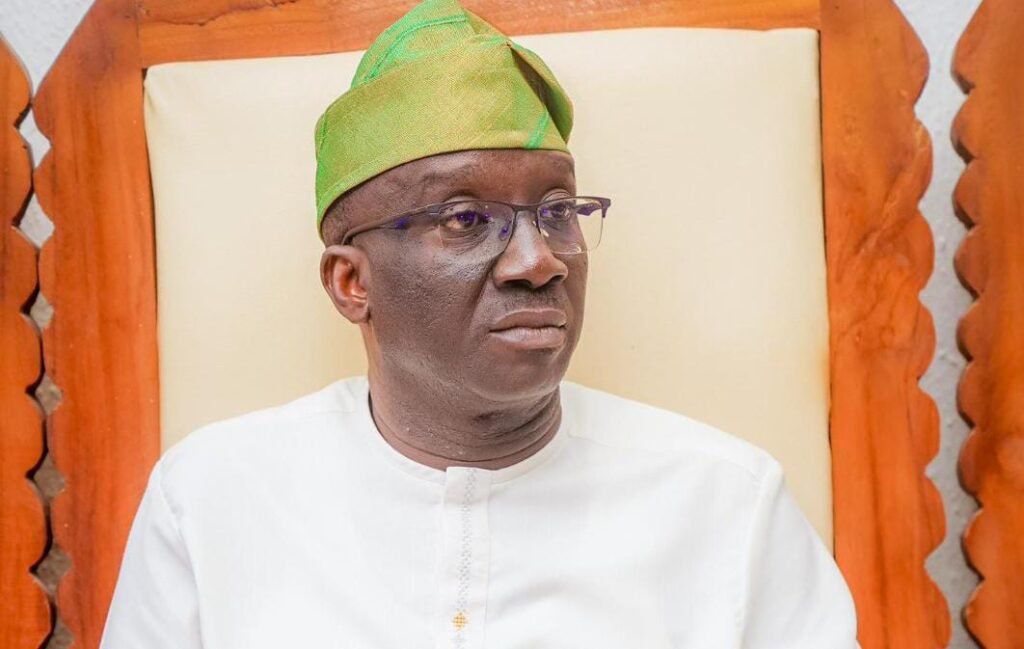
Keep up with the latest news and be part of our weekly giveaways and airtime sharing; follow our WhatsApp channel for more updates. Click to Follow us
Just hours before the Edo State Governorship tribunal’s verdict was due, copies of the verdict that had not yet been reviewed were leaked online, causing confusion.
The primary ruling rejected the petition and upheld Governor Monday Okpebholo’s election, according to the ruling document circulating online.
Remember that on March 3, the three-member tribunal headed by Justice Wilfred Kpochi postponed rendering a decision in the lawsuit that the Peoples Democratic Party (PDP) and its candidate, Mr. Asue Ighodalo, filed to contest the results of the state’s September 21, 2024, governorship election.
Early on Tuesday morning, the panel instructed the parties to come before it for the ruling on Wednesday, April 2, 2025.
Copies of the ruling leaked online in what seemed to be a leak, suggesting that the tribunal’s decision was divided two to one.
According to the leaked document, Justice Kpochi, the tribunal’s chairman, and Justice A. B. Yusuf, its first member, rejected the petition and upheld Governor Monday Okpebholo’s election. Justice A. A. Adewole, the panel’s third member, directed INEC to issue a new Certificate of Return to Ighodalo of the PDP as the legitimate winner of the election.
Justice Adewole said in the minority ruling that Governor Okpebholo’s election was void due to his failure to substantially comply with the Electoral Act’s requirements.
He declared that Governor Okpebholo, the second respondent, had not been legitimately elected by a majority of legitimate votes and went on to declare his victory in the gubernatorial election void.
In the leaked documents, Justice Adewole was credited with holding that the petitioner’s argument was not refuted and demonstrated, unit by unit, how the actual total should be 243,113 votes, while the second respondent’s tally should stand at 210,326 votes – a blatant reversal of the proclaimed result.
However, Justice Kpochi, the tribunal’s chairman, stated in the majority ruling that “while there was credible evidence of non-compliance, particularly concerning section 73(2) (failure to record serial numbers in EC 25B) and section 51(2) (over-voting), the petitioners failed to demonstrate that these breaches substantially affected the outcome of the election as required under section 135(1) of the Electoral Act”
Regarding the majority of valid votes, the petitioners provided examples of improper results collation and exclusion.
Their documentation and mathematical proof, however, did not prove beyond a reasonable doubt that they received the most legitimate votes or that the lead was surpassed.
The majority ruling was based on the Supreme Court’s rulings in Atiku vs. INEC (2023), 19 NWLR, pt. 1927, and Oyetola vs. Adeleke, 2023, 10 NWLR (Pt 1892). According to the panel, the petitioners were unable to demonstrate both the occurrence of non-compliance and its severity enough to have impacted the election’s outcome.
“We find that the petitioners have not discharged the dual burden to the satisfaction of the law.
“Accordingly, the petition lacks merit and is hereby dismissed,” the document further read.
As at the time this article was filed, ZINGTIE was unable to verify that the leaked judgment document was authentic.
Recall that the Independent National Electoral Commission, or INEC, announced that Okpebholo of the APC had received 291,667 votes, defeating Ighodalo of the PDP, his nearest opponent, who received 247,655 votes.
On October 11, 2024, the PDP and its candidate, Ighodalo, went to the tribunal to protest the poll’s results, claiming that it was not carried out in a way that complied with the Electoral Act of 2022.
Please don’t forget to “Allow the notification” so you will be the first to get our gist when we publish it.
Drop your comment in the section below, and don’t forget to share the post.





